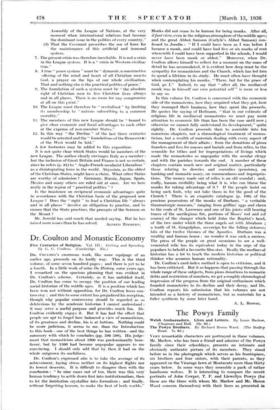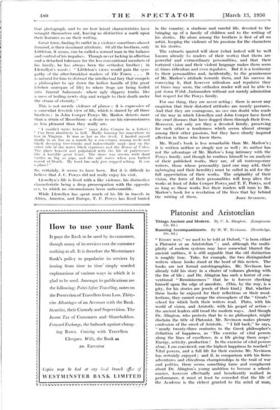The Powys Family
Welsh Ambassadors. Lives and Letters. By Louis Marlow. (Chapman and Hall. 12s. 6d.) The Powys Brothers. By Richard Heron Ward. (The Bodley Head. 7s. W.) VERY remarkable characters are portrayed in these volumes.
Mr. Marlow, who has been a friend and admirer of the Powys family since their schooldays, presents an intimate and obviously authentic picture of its members. They stand before us in the photograph which serves as his frontispiece, six brothers and four sisters, with their parents, as they
appeared on the Vicarage lawn at Montacute more than thirty years below. In some ways they resemble a pack of rather handsome wolves. It is interesting to compare the recent portraits of John Cowper, T. F. and Llewellyn Powys (for these are the three with whom Mr. Marlow and Mr. Heron Ward concern themselves) with their faces as presented in
that photograph, and to see how. latent characteristics_ have wrought themselves out, leaVing as distinctive a inarksupen their features as on their writing.
Great force, finding its outlet in a violence sometimes almost frenzied, is their dominant attribute. Of all the brothers, only Littleton, it seems, can be called a.normal man in the balance and control of his impulses. Though never lacking in affection and a detached tolerance for the less conventional members of his family, he has always been the orthodox brother ; lit
Llewellyn's words : " Littleton's views would gain the sym- pathy of the after-breakfast readers of The Times. . . . It is natural for him to distrust the intellectual fury that compels a philosopher to spy down the hollow handle of [the great kitchen saucepan of lifej to where frogs are being boiled into funeral bakemeats--where ugly slippery truths like a mess of boiling newts skip and wriggle to their death under the steam of eternity."
This is not merely violence of phrase ; it is expressive of a somewhat feverish view of life, which is shared by all three brothers ; in John Cowper Powys Mr. Marlow detects more than a strain of Masochism—a desire to see his circumstances as less pleasant than they really are.
"I couldn't write before " (says John Cowper in a letter); " I've boon absolutely in hell. Madly limiting for somewhere to live in Virginia. It was as hot as the devil. I landed myself filially in an Inn on a marsh by a sea-estuary among reeds and black decaying tree-trunks and indescribable mud—and on the ether Rido of the water black cypresses and the House of Usher. The place heaved and palpitated with the life of putrescence like a horrible great heart. The shore was strewn with dead turtles as big as pigs, and the salt water when you bathed tasted of Death. My head has only just stopped aching. It ica.1 a place ! "
4o, certainly, it seems to have been. But it is difficult to believe that J. C. Powys did not really enjoy his visit.
Llewellyn's life is lived with a like violence, his distinctive characteristic being a deep preoccupation with the opposite sex, to which no circumstances 'seem unfavourable.
While Llewellyn has spent much of his life in travels in Africa, America, and Europe, T. F. Powys has lived buried
in the country, a studious and careful life, devoted to the bringing up of a family of children and to the writing of his stories. He alone among the brothers is first of all an artist, keeping the violence of his passions for the characters in his stories.
The extracts quoted will show (what indeed will be well known already to readers of their works) that theirs are powerful and extraordinary personalities, and that their tortured vision and their violent language makes them seem at times ridiculous and even repulsive. But it is a testimony to their personalities and, incidentally, to the genuineness of Mr. Marlow's attitude towards them, and his success in conveying it, that however ridiculous and repulsive they at times may seem, the orthodox reader will not be able to put down Welsh Ambassadors without not merely admiration but respect for the Powys family.
For one thing, they are never acting ; there is never any suspicion that their distorted attitudes are merely postures. And that they are courageous, no one can doubt who reads of the way in which Llewellyn and John Cowper have faced the cruel diseases that have dogged them through their lives. Moreover, not only are they a devoted family, preserving for each other a tenderness which seems almost strange among their other passions, but they have clearly inspired affection in those who know them.
Mr. Ward's book is less remarkable than Mr. Marlow's ; it is written neither so simply nor so well ; its author has not the advantage of Mr. Marlow's long intimacy with the Powys family, and though he confines himself to an analysis of their published works, they are,' of all contemporary writers, those whose personality (and one may add, their upbringing and their heredity) must be called in aid for the full appreciation of their works. The originality of their vision; the force of their personalities will keep alive the works at least of John Cowper Powys and T. F. Powys, and as long as those works live their readers will turn to Mr. Marlow's book for a revelation of the lives that lay behind















































 Previous page
Previous page